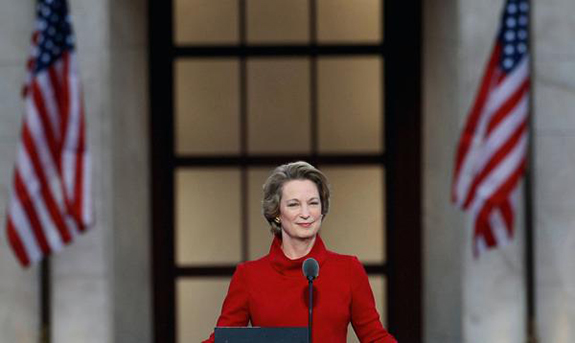Susan Eisenhower opens up about life and legacy

October marks the 125th anniversary of President Dwight D. Eisenhower’s birth. Eisenhower’s granddaughter, Susan Eisenhower, came to Gettysburg to aid in the commemoration of her grandfather. Photo courtesy of eisenhowerinstitute.org
By Kayla Britt, News Editor
Susan Eisenhower is an accomplished woman who lights up the room with her natural charisma, elegant demeanor and intellectual curiosity. She is a woman of many talents: she is the author of several books, including Breaking Free, Mrs. Ike and Partners in Space; she is the Chairman of Leadership and Public Policy Programs and Chairman Emeritus of the Eisenhower Institute and an expert on foreign policy, specifically energy-related policy.
Foreign policy has been the primary focus of her career, as energy is a global sector, and oil and gas both have significant geopolitical impacts. While policy has been the main focus of her career, she has enjoyed publishing the most. Her smile widens as she discusses writing and the beauty of language; she particularly enjoys reading Russian novels and books about writers.
“My favorite book is yet to be written,” she said.
She describes herself as “bringing the practical world to the academic campus” through her work with the Eisenhower Institute, which was established to carry out a strategic approach to international and domestic policy. Ms. Eisenhower speaks to students about the importance of determining what can be done policy-wise within logistical, economic and political constraints. She often uses World War II as a prime example of excellent negotiation and problem solving to meet strategic goals.
“I help my students see what they are looking at in a different way,” she said. Her volume of life experience and knowledge is an invaluable resource for students.
Eisenhower said the most unique thing she has done in her life was going inside the third fence at a top-secret weapons facility in Russia. She focused extensively on improving US-Russian relations towards the end of the Cold War. Unfortunately, there are fundamental differences between the two nation’s policies and goals which lead to strained relations. She believes that the U.S. could improves its management of complicated diplomatic situations by studying Russia’s approach. One major issue in diplomacy, she believes, is that there is no common language.
“Russian and US musicians can perform together but not converse,” she said. “Politicians do not have a common language.” Working on diplomatic issues requires time to form bonds and break cultural barriers.
Eisenhower has fond memories of her grandfather, President Dwight D. Eisenhower. She said she was fortunate enough to know him well.
“During elementary school I spent a lot of time with him and visited often as a teenager,” she said. “He was a big part of my life.” She finds visiting Gettysburg to be enjoyable, as she sees some individuals she knew from elementary school and familiar touchstones she knew while growing up. President Eisenhower was also a source of inspiration for her interest in international policy.
“Granddad used the farm to invite international visitors, so I had a large dose of exposure at a young age,” she said.
While colleges like Gettysburg often emphasize the concept of leadership, Susan Eisenhower believes the word “leadership” is overrated: “There are people in ‘leadership positions’ who have the title, but do not necessarily want to do the work,” she said. There is more to being a leader than what it is implied in the name.
“All the great leaders had guts, courage and decisiveness. It takes a lot to stick your head out without knowing the outcome.” She appreciates that Gettysburg is placing an emphasis on developing leadership skills and hopes that some students will become the kinds of leaders who lead for change.
Her advice for college students and recent grads? “Be open,” she said. “More important than knowledge is emotional and intellectual openness and being willing to pursue knowledge.” One of her favorite quotes, which she shared at the end of the interview, is, “If you do not know where you are going, any road will get you there,” attributed to George Harrison, lead guitarist of The Beatles.
